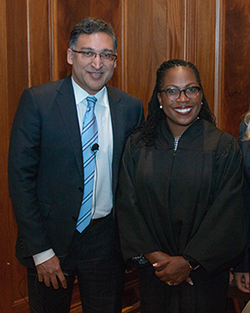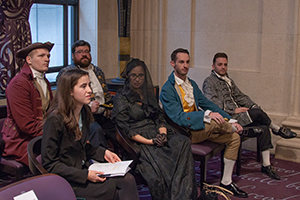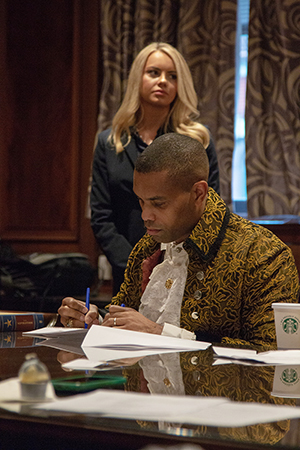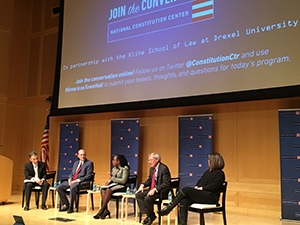Founding father Alexander Hamilton’s historic and legal relevance came into vivid focus at events the law school sponsored at the Thomas R. Kline Institute of Trial Advocacy and the National Constitution Center on Nov. 15.
 Judge Ketanji Brown Jackson of the U.S. District Court for the District of Columbia presided over a mock trial that was intended, finally, to determine if Vice President Aaron Burr was guilty of murdering Hamilton, whom he shot to death in an 1804 duel. Burr was never tried.
Judge Ketanji Brown Jackson of the U.S. District Court for the District of Columbia presided over a mock trial that was intended, finally, to determine if Vice President Aaron Burr was guilty of murdering Hamilton, whom he shot to death in an 1804 duel. Burr was never tried.
The prosecution was led by Kline & Specter partner Andrew Stern, former U.S. Solicitor General Gregory Garre (now a partner Latham and Watkins) and 3L Elizabeth Bertolino.
The defense was led by Senior Training Adviser Patricia McKinney of the Philadelphia District Attorney’s Office, former acting Solicitor General Neal Katyal (now a partner at Hogan Lovells) and 3L Robert Goggin.
 The half-day trial unfolded in the institute’s grand courtroom, where witnesses played by law students and attorneys wearing period costumes testified for the prosecution and the defense in proceedings inspired by the blockbuster Broadway phenomenon, “Hamilton.”
The half-day trial unfolded in the institute’s grand courtroom, where witnesses played by law students and attorneys wearing period costumes testified for the prosecution and the defense in proceedings inspired by the blockbuster Broadway phenomenon, “Hamilton.”
“Some might say that this trial is long overdue,” Tom Kline, founding partner of Kline & Specter and law school benefactor said, welcoming alumni and other attorneys who took part in the unique CLE program as “jurors.”
The trial shone a spotlight on towering figures in American history whose bitter political rivalry altered its course as well as their own fortunes: Hamilton, Gen. George Washington’s treasured aide during the Revolutionary War who went on to promote the U.S. Constitution and craft the nation’s financial system died in his 40s, and Burr, who proved his mettle in battle before becoming a revered and influential U.S. Senator from New York and Thomas Jefferson’s vice president brought his own political trajectory to an end with the duel.
Witnesses for the prosecution included Judge Nathaniel Pendleton, who aided Hamilton as his second in the duel and was played by 2L Robert Waeltz, Eliza Hamilton, the slain treasury secretary’s widow – played by Professor Rachel López – and pistol manufacturer Robert Wogdon, played by attorney Guy D’Andrea of Laffey, Bucci and Kent.
The three, echoing arguments made by Garre and Stern, portrayed Hamilton as a dizzyingly ambitious and accomplished striver, a devoted if conflicted husband and a heroic Revolutionary War marksman whose respect from Washington inspired the enmity of Burr, who envied his proximity to power. As the duel began, they said, Hamilton shot his pistol into the air, signaling that he had no desire to harm Burr.
 Burr, played by Kline & Specter partner David Williams, was joined in his defense by attorney and political ally William Van Ness, played by 3L Michael Wentz, and pistol manufacturer John Barton, played by Anthony Carissimi, judicial clerk for Judge Theodore McKee of the U.S. Court of Appeals for the Third Circuit.
Burr, played by Kline & Specter partner David Williams, was joined in his defense by attorney and political ally William Van Ness, played by 3L Michael Wentz, and pistol manufacturer John Barton, played by Anthony Carissimi, judicial clerk for Judge Theodore McKee of the U.S. Court of Appeals for the Third Circuit.
The witnesses joined McKinney and Katyal in portraying Burr as a man betrayed when his one-time protegé, undone by the death of his son and the taint of a highly publicized affair, published critiques that undermined his former mentor’s presidential ambitions. Hamilton’s heralded skill at marksmanship combined with signs that he’d set a hair trigger on his pistol, forced Burr to shoot in self-defense, they claimed.
The jury returned a 25-24 verdict exonerating Burr in the trial, which was organized and planned by Professor Lisa Tucker, Professor and Trial Advocacy program Director Gwen Roseman Stern, Trial Advocacy program Assistant Director Abbie Heller and Andrew Stern.
In the evening, the law school co-sponsored a panel discussion at the National Constitution Center that explored Hamilton’s enduring legacy.
Moderated by National Constitution Center CEO Jeffrey Rosen, the discussion featured Judge Jackson, Berkeley Law Dean Erwin Chemerinsky, University of Kentucky College of Law Professor Joshua Douglas and Vanessa Nadal, legal counsel for 5000 Broadway Productions and the wife of “Hamilton” creator Manuel Lin Miranda.
Hamilton deserves tremendous credit for shaping our system of government and considerable blame for permitting vulnerabilities in our electoral processes, Chemerinsky said. The constitution that was ultimately adopted largely reflected Hamilton’s vision, Chemerinsky said, noting that the federalism he promoted has enhanced interests such as national security and desegregation and that the judicial review he promoted helped ensure that laws found to violate the constitution will be struck down. On the other hand, Chemerinsky said, Hamilton’s “elitist disdain of the people” drove him to support the Electoral College, which has allowed presidents to take office even though they have not won the popular vote.
 “No other country allows a presidential candidate who comes in second to win,” Chemerinsky said. “Alexander Hamilton deserves a lot of blame for that.”
“No other country allows a presidential candidate who comes in second to win,” Chemerinsky said. “Alexander Hamilton deserves a lot of blame for that.”
Noting that the Electoral College ensures that presidents have received support from diverse parts of the country, Douglas said some states are pursuing “popular vote plans” that direct electors from their state to support the winner of the popular election. It’s not clear that this “workaround” is constitutional, Douglas said, adding that the states that have enacted such laws to date are all led by Democrats.
The panelists agreed that Hamilton’s legacy has gained a massive infusion of new interest, thanks to the play that has become an international phenomenon since opening on Broadway in 2015.
The Hamilton Education Program is helping high school students around the globe to develop a keen interest in American history and government, Nadal said, noting that 20,000 teens in New York City alone have seen the play, while others are gaining access as the show opens in a growing number of cities. The musical puts the founders’ strengths and frailties on vivid display, bringing them to life as real people, Nadal added.
Hamilton’s thinking as captured in the musical has even found its way into judiciary, Jackson said, adding that she cited lyrics from the “The Room Where It Happens” to expound on an issue of standing in a 2016 ruling: “You don’t get a win unless you play in the game.”